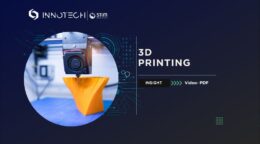
About Course
3D Printing Patent Landscape Report
Scope & Methodology
- Covers 589,000 global patents related to 3D printing.
- Uses a combination of AI-driven analytics, machine learning, and expert review to extract insights from structured patent metadata across databases like WIPO, USPTO, EPO, etc.
- Outputs are delivered as PDF reports and interactive dashboards for flexible data exploration.
- Key Findings
- Explosive Growth
- Patent filings increased 9x since 2010.
- In 2024, there were 8,682 new patents, with nearly 20,000 still pending — reflecting intense R&D and emerging innovation.

- Technology Focus
- Top areas:
- Additive manufacturing processes (especially B29C64).
- Advanced material technologies.
- Precision control systems.
- Major trend in metal additive manufacturing, multi-material capability, and AI-driven process optimization.
- Geographic Dominance
- United States leads with 76.7% of total patents (45,219 filings), followed by Europe and China.
- General Electric is the top patent holder with 2,290 filings.
- Market Potential
- Estimated to grow from $37.4B to $149.4B by 2030.
- CAGR: 16.4%–20.5% – one of the fastest-growing advanced manufacturing sectors.
- Technology Trends
- Post-2017, a surge in pending patent families indicates a wave of early-stage innovation.
- Top IPC classes: additive manufacturing and plastic shaping techniques dominate global innovation efforts.
- Strategic Recommendations
- For Policy Makers
-
- Support metal 3D printing for aerospace and medical use.
- Invest in multi-material and recyclable technologies.
- Fund industry-specific innovation (e.g., dental applications).
- For Investors
-
- Prioritize companies with IP in novel materials, AI-driven optimization, and precision control systems.
- Track new markets in construction and bioprinting.
- For Manufacturers
-
- Support standards for 3D printing materials and hardware.
- Promote academic-industry collaborations.
- Develop material recycling protocols.